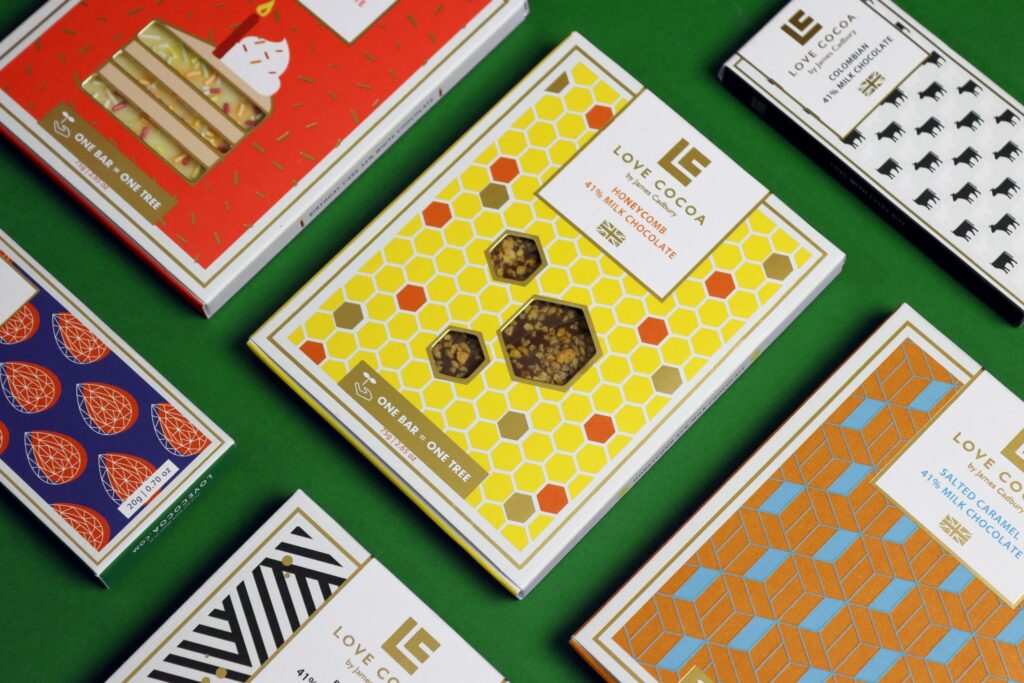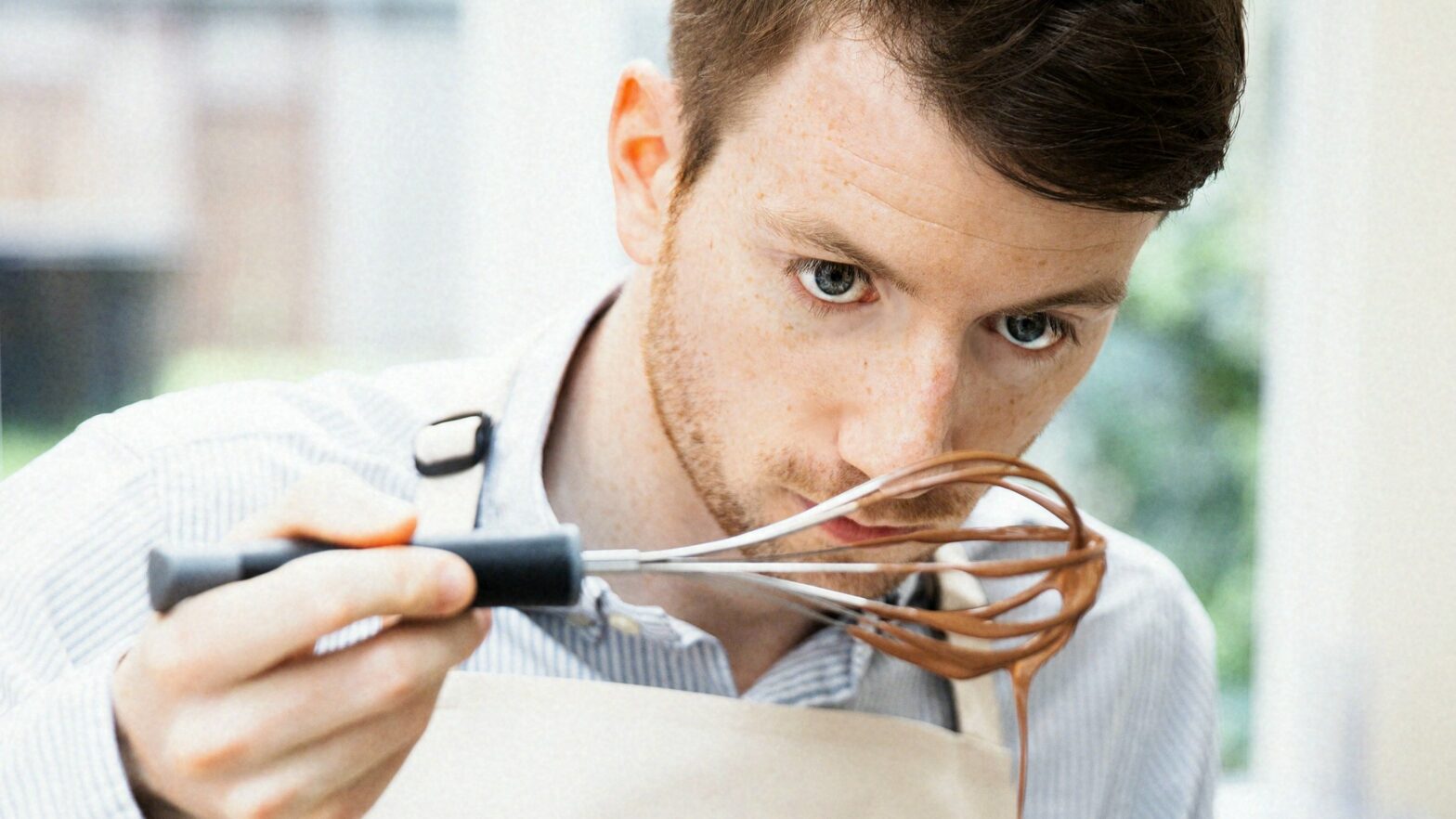Love Cocoa is the luxury, ethical chocolate start-up created by James Cadbury (great-great-great grandson of Cadbury founder John Cadbury).
Based in Dalston, London, Love Cocoa has five full-time staff, while production of its handmade chocolate is outsourced to a family-run factory based in Stoke.
The brand offers luxury, ethical chocolate sustainably sourced from Columbia, palm-oil free with 100 per cent recyclable packaging and compostable inners made from wood pulp. Quirky flavours included gin and tonic, avocado and birthday cake.
The brand turned down an investment offer from Dragons’ Den in 2018 and has grown 400 per cent since to become a million-pound brand.
Love Cocoa is about to redesign its brand and launch a tree-planting project – “One bar = one tree”; for every Love Cocoa product sold, the company will plant a tree in partnership with the charity Trees for the Future, with the aim of planting over 500,000 trees in northern Cameroon in 2020, helping cocoa farmers gain a much needed second source of income while combating deforestation and climate change.
>See also: Coronavirus small business diary – Alessandro Savelli, Pasta Evangelists
25th January
We begin to think that the path ahead might be tricky when the bespoke moulds for the newly redesigned bars (what the factory uses to pour chocolate into to create Love Cocoa chocolate bars) that we ordered from China back in December are delayed. We expect them to arrive at the end of January, but then COVID-19 hits China and forces lockdown and the closure of factories the length and breadth of the country, we know that it’s just not going to happen. I get on the phone to our factory in Stoke to see if there’s the possibility of bumping up current production as we’d started to run stock down in anticipation of the upcoming redesign.
2nd – 5th February
As COVID-19 spreads to the UK, I try to put worries about that, the redesign and the delay of the moulds to the back of my mind as I board the plane to Cologne, where we’re about to launch our new look and tree planting initiative at the world’s largest trade fair for confectionery and snacks – ISM 2020. The reaction on the ground there is overwhelmingly positive. I return with a renewed sense of energy and purpose.

28th February
Everyone in the retail industry is feeling nervous about what’s to come, we plan as much as we can, but so much is out of our hands.
In spite of the situation, we end the week with some good news that our new Easter eggs have sold out on both Ocado and on our website. Even though nobody really feels in the mood to celebrate, we start to number crunch for next Easter, adding extra quantities and researching extending the range.
7th – 8th March
Panic buying hits the UK with food rationing starts at some of the supermarkets for essential items as people see the situation worsen both in the UK and across Europe. We begin to be inundated with online orders. Our warehouse in Milton Keynes is working round-the-clock to sort orders and managing really well but we have to extend usual delivery turnaround timings as courier demand is so much higher than usual.
16th March
We brainstorm ideas around what customers are looking for right now and decide to introduce 8 x new care hampers ranging from large family ones to smaller letterbox friendly offerings, which completely avoid human contact.
20th – 22nd March
I receive the most bizarre call of my life. It’s Friday afternoon and my mobile rings with an unknown number. I pick up to find it’s Sarah Ferguson, the Duchess of York. She chats about how much she loves our products and whether we’d be interested in partnering up to donate sweet treats to NHS workers in London. We’d been thinking of what we could do to help in any case, so this seems like perfect timing and we quickly decide to join forces that very weekend, staying in the office until late on Friday evening to launch on the website and on social. For every product we sell, we donate another product to an NHS worker, providing a welcome pick-me-up after a long work shift. The campaign is a huge success and not only are we able to donate over 2,000 chocolate bars, our involvement also acts as a catalyst for other brands to come on board, resulting in over half a million donations for NHS workers to date.
23rd March
From the high of the weekend’s campaign down to a low… hot on the heels of schools closing, we learn today that non-essential retailers are being told to shut with lockdown being announced. Eighty per cent of our retail business (via independent retailers) goes overnight and I’m left reeling. Our saving grace is that we have always sold direct-to-consumer via our website and online sales continue to rocket with consumers looking to treat themselves (and loved ones) with quality chocolate.
We all start to work from home, which is relatively easy to manage when you’re a close-knit team of five. We rely on Google to keep in touch, using its chat and meeting functions and keep in touch daily, trying to just get on with what needs to be done.
31st March
We’ve just looked at the figures and online sales have gone through the roof – up 3,000 per cent versus the same time last year. This compensates somewhat (but not completely) for the retail business lost.
‘What could possibly happen next, I wonder’
1st April
I receive the call I’ve been dreading… the factory we use in Stoke is shutting its doors due to COVID-19. Added to that, we still have the ongoing saga of the chocolate moulds from China – they’ve shipped but are now caught up in storms out at sea – you couldn’t make it up. This keeps pushing back the redesign launch timings. We’ve only got a couple of weeks of stock left and a lot of our product lines are already completely sold out. What could possibly happen next, I wonder.
4th April
Beyond excited to hear the first tree has been planted as part of our pledge to plant 500,000 trees in partnership with the charity, Trees for the Future. The tree has been planted in Cameroon’s Western Province by farmer Sop and technician Alain. We’re planting a variety of trees including mango and lemon, all aimed at helping the environment, but also giving families the ability to transition from unsustainable farming techniques.
15th April
Just as it looks like we’re going to have to shut our online store down due to stock issues, I receive the good news that the factory plans to reopen at 10 per cent workforce to make chocolate for us. And not only that, our shipment of chocolate moulds turns up from China enabling us to finally launch the new shaped bars.
28th May
In spite of the warmer weather, which usually equals a downward turn in sales, we buck the trend and triple our chocolate subscribers, while our newly introduced chocolate hampers are performing brilliantly. As the COVID-19 curve flattens, we end up having a record May in terms of online sales. The redesigned bars are performing well on our website with sales conversion rates higher than usual. And although we have a bit of a mish-mash of stock available online (new bars and old bars alongside each other), we’re beginning to feel a little more confident about the future.
June
We apply for a CBIL (Coronavirus Business Interruption Loan) via HSBC and are amazed by the quick turnaround. Within two weeks, we’ve received £245,000 to help see the business through.
The factory in Stoke is now running at 75 per cent capacity, which is good news as we’re still seeing online sales up 500 per cent year on year.
Retailers slowly begin to place orders again in anticipation of shops opening on the 15th June, from larger stores like Harrods through to the likes of Eat 17 and Bayley & Sage as well as smaller outfits. It feels like some sort of normality is being restored and long may it continue.
Further reading
Coronavirus small business diary – Stitch & Story CEO Jennifer Lam





